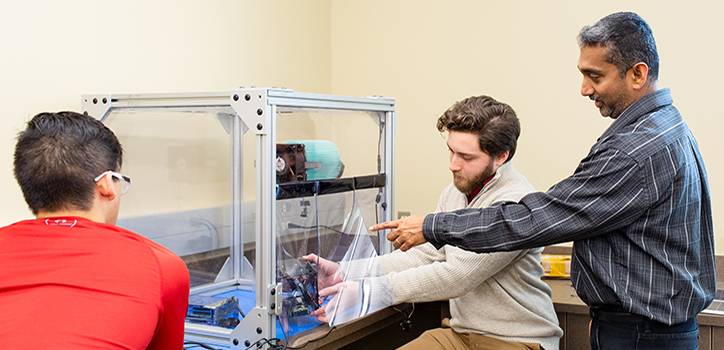Electrical & Computer Engineering Graduate Program

|
|
Accelerated Bachelor’s to Master’s (ABM) program
The ABM program allows full-time undergraduate students within two semesters of BSEE or BSCpE graduation at USA, who have a cumulative GPA of 3.0 or better at USA (with at least 30 credit hours taken at USA), to earn their MSEE degree at an accelerated pace. Students registered for the ABM program may use up to six credit hours of graduate course work towards both the BSEE/BSCpE and MSEE degrees. This means that after earning the BSEE or BSCpE degree the course load for the MSEE degree is reduced by six credit hours. More information is available here.
Master of Science degree in Electrical Engineering (MSEE)
A Master’s degree in Electrical Engineering is increasingly required for advanced-level employment opportunities with higher-profile national and international employers. Students who want to separate themselves from the pack in the employment race should seriously consider taking a Master’s degree either through the ABM program (see above) or as a stand-alone qualification. The programs of study provide knowledge of modern engineering concepts and practices, and build upon the knowledge and skills expected of a holder of a typical Bachelor’s degree to the point where a Master’s graduate can make high-level contributions to contemporary engineering designs. A Master’s degree is also an ideal preparation for further study towards the doctoral degree if desired.
MSEE students can choose one of three tracks: Electrical Engineering, Computer Engineering, or Systems Engineering. Within each track, three study options are available: Thesis, Project, or Course. The Thesis option requires writing a medium-length technical report counting as 6 credit hours. This thesis is generally a contribution to original engineering research on a topic of great relevance to the current state-of-art in Electrical or Computer Engineering. The Project option requires writing a shorter technical project report counting as 3 credit hours, usually heavily oriented toward Electrical or Computer Engineering applications. Finally, the Course option includes no project work. All options require a total of 30 credit hours. More information is available here.
- Regular Admission
- A B.S. degree in electrical or computer engineering or closely related field is required.
- A grade-point average of 3.0 or greater (A=4.0) on all undergraduate work is required. This can be relaxed depending on the academic background and experience of the applicant.
- A minimum score of 151 in the quantitative section and a minimum score of 141 in the verbal section of the Graduate Record Examination (GRE) is required. These requirements may be relaxed slightly depending upon special individual circumstances evaluated holistically. GRE scores are not required for ECE students who have graduated from the University of South Alabama.
- For International students whose native language is not English, a minimum score of 550 on the written Test of English as a Foreign Language (TOEFL), or a minimum score of 79 on the Internet-based TOEFL exam, or a minimum score of Band 6.5 on the International English Language Testing System (IELTS) test, is required (or other English language test results may be considered).
- Provisional Admission
- A B.S. degree in electrical or computer engineering, or in a field acceptable to the departmental Graduate Admissions Committee, is required. Depending on the student's background, additional undergraduate preparatory courses may be required. These courses will not count toward the MS degree.
- A minimum grade-point average of 2.5 (A=4.0) on all undergraduate work, including a minimum grade-point average of 2.5 over the last 64 course hours of undergraduate work is required. Alternatively, a minimum grade-point average of 2.75 over the last 64 course hours of undergraduate work is required.
- A minimum GRE combined score greater than or equal to 283 (Verbal + Quantitative) is required. GRE scores are not required for ECE students who have graduated from the University of South Alabama.
- For International students whose native language is not English, a minimum score of 525 on the written Test of English as a Foreign Language (TOEFL), or a minimum score of 71 on the Internet-based TOEFL exam, or a minimum score of Band 6.0 on the International English Language Testing System (IELTS) test, is required (or other English language test results may be considered).
Admission may be granted in special cases where a holistic evaluation of the applicant’s credentials is appropriate.
The requirements of each of the study options are as follows (and summarized in the PDF available here):
- Thesis Option (30 credit hours)
- 9 credit hours selected from core courses of chosen track
- 15 credit hours selected from other EE Graduate-level courses;1 up to 6 credit hours of these may optionally be substituted by Other Discipline courses
- Responsible Conduct of Research training from CITI Program
- 6 credit hours Thesis EE 599 & EE 599
- Successful oral defense of Thesis
- Project Option (30 credit hours)
- 9 credit hours selected from core courses of chosen track
- 18 credit hours selected from other EE Graduate-level courses;1 up to 6 credit hours of these may optionally be substituted by Other Discipline courses
- Responsible Conduct of Research training from CITI Program
- 3 credit hours Project EE 594
- Successful oral defense of Project Report
- Course Option (30 credit hours)
- 9 credit hours selected from core courses of chosen track
- 21 credit hours selected from other EE Graduate-level courses;1 up to 6 credit hours of these may optionally be substituted by Other Discipline courses
- Responsible Conduct of Research training from CITI Program (required by all MSEE students)
Core courses for each track:
Electrical Engineering track core courses:
EE 530 – Nanotechnology
EE 534 – VLSI Design Systems
EE 560 – Advanced Computer Architecture
EE 566 – Digital Image Processing
EE 590 – Special Topics in Computer Science/Engineering
Computer Engineering track core courses:
EE 530 – Nanotechnology
EE 534 – VLSI Design Systems
EE 560 – Advanced Computer Architecture
EE 566 – Digital Image Processing
EE 590 – Special Topics in Computer Science/Engineering
Systems Engineering track core courses:
EE 560 – Advanced Computer Architecture
EE 566 – Digital Image Processing
EE 590 – Special Topics in Computer Science/Engineering
SE 601 – Systems Engineering Fundamentals
SE 602 – Risk and Failure Analysis
Other Discipline courses:
BME 567 – Principles of Biomedical Eng
CIS 535 – Digital Forensic Analysis
CSC 513 – Computer Graphics
CSC 514 – Modeling and Simulation
CSC 516 – AI Theory and Programming
CSC 517 – Computer Game Development
CSC 522 – Performance Eval of Algorithms
CSC 526 – Data Mining
CSC 533 – Adv AI Theory and Programming
ME 538 – Finite Element Analysis
MA 537 – Complex Analysis
MA 565 – Numerical Analysis
MA 567 – Operations Research
MA 571 – Ordinary Diff Equations
MA 572 – Partial Differential Equations
MA 581 – Cryptography
SE 601 – Systems Engineering Fundamentals
SE 602 – Risk and Failure Analysis
SE 603 – Integration, Testing and Evaluation
SE 605 – Project Engineering
SE 609 – Engineering Research Methods
There are no deadlines for graduate study applications in Engineering, but you are recommended to apply in good time to allow evaluation of your application and to make arrangements to relocate here if admitted.
Doctor of Philosophy degree (PhD)
The PhD is the highest degree available in most disciplines. The PhD program is designed to prepare students for leadership positions in applied research, to meet the needs of industry and the engineering community for highly-qualified technical experts, and to capitalize on opportunities for interaction between a research university and industry. Graduate faculty members of the Electrical and Computer Engineering (ECE) Department are ready to advise and supervise students who wish to earn a Doctoral degree (PhD) in Systems Engineering following the ECE Track, or in Biomedical Engineering (a track of the Basic Medical Sciences PhD offered in conjunction with the USA College of Medicine).
The Systems Engineering PhD (ECE Track) offers students a holistic approach to the design and understanding of complex electrical, electronic or computer systems. Graduates of this track can apply the fundamental principles of Systems Engineering complemented by advanced knowledge of Electrical and Computer Engineering to a variety of scientific areas, such as power, control, electronics, electromagnetics, image processing, computer networks and advanced computer architecture with an application focus. The main objectives of this PhD program are to 1) provide our graduates with the ability to approach electrical or computer engineering with the ability to understand the entire system lifecycle in a manner that meets the needs of industry, and 2) prepare our graduates for leadership positions requiring applied research, strong theoretical background and critical thinking.
This program is appropriate for students who want to pursue research-based careers in industry, government, or academia. The program requires a combination of systems and electrical/computer engineering coursework along with ECE research resulting in a publicly defended doctoral dissertation.
|
|
More information about Systems Engineering
Students may pursue a doctorate in Biomedical Engineering through the Interdisciplinary Graduate Program in Basic Medical Sciences. This program is offered under a collaboration between faculty of the USA College of Engineering and faculty of the USA College of Medicine. The program combines an interdisciplinary core curriculum with advanced coursework and research in biomedical engineering. Students must meet requirements established for the Basic Medical Sciences graduate program in the College of Medicine.
PDF summarizing Biomedical Engineering track of PhD in Basic Medical Sciences
Overview of Biomedical Engineering track of PhD in Basic Medical Sciences
Details of Biomedical Engineering track of PhD in Basic Medical Sciences
Concerned about your class or instructor? The College policy on Student Concerns is here.




 Prospective students are encouraged first to contact Dr. Silas Leavesley (leavesley@southalabama.edu),
Director, Biomedical Engineering Graduate Program, to discuss the program that best
fits their intended career path.
Prospective students are encouraged first to contact Dr. Silas Leavesley (leavesley@southalabama.edu),
Director, Biomedical Engineering Graduate Program, to discuss the program that best
fits their intended career path.